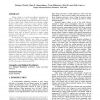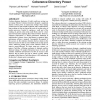40 search results - page 7 / 8 » Dynamic zero compression for cache energy reduction |
124
click to vote
MICRO
2009
IEEE
15 years 8 months ago
2009
IEEE
Voltage scaling is one of the most effective mechanisms to reduce microprocessor power consumption. However, the increased severity of manufacturing-induced parameter variations a...
108
click to vote
IPPS
2007
IEEE
15 years 8 months ago
2007
IEEE
— Modern CPUs operate at GHz frequencies, but the latencies of memory accesses are still relatively large, in the order of hundreds of cycles. Deeper cache hierarchies with large...
104
click to vote
MICRO
2000
IEEE
15 years 5 months ago
2000
IEEE
Data, addresses, and instructions are compressed by maintaining only significant bytes with two or three extension bits appended to indicate the significant byte positions. This s...
133
click to vote
ISLPED
2010
ACM
15 years 2 months ago
2010
ACM
On-chip coherence directories of today's multi-core systems are not energy efficient. Coherence directories dissipate a significant fraction of their power on unnecessary loo...
141
Voted
CGO
2005
IEEE
15 years 7 months ago
2005
IEEE
To minimize the surging power consumption of microprocessors, adaptive computing environments (ACEs) where microarchitectural resources can be dynamically tuned to match a program...


